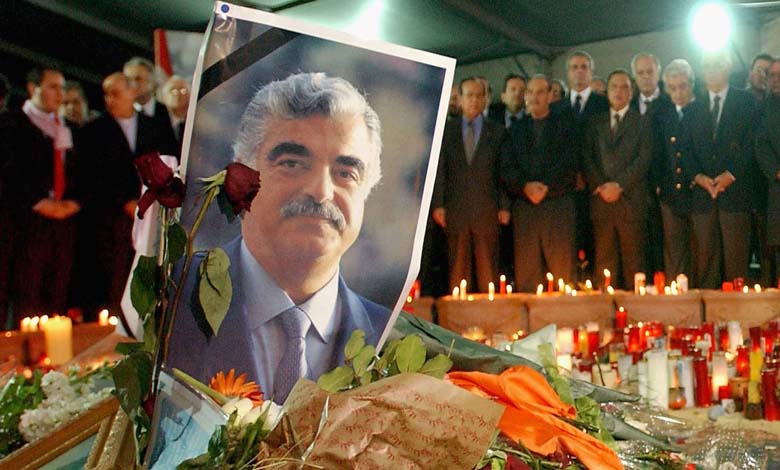Anniversary of Hariri’s Assassination: Lebanon Remembers the Wound and Looks to a New Era

Twenty years ago, on Valentine’s Day, Lebanon was painted in an unusual shade of red—not one of love, but of blood—as it mourned its most prominent Prime Minister.
On February 14, 2005, Lebanon witnessed the assassination of its former Prime Minister, Rafic Hariri—a peacemaker and the man credited with saving the country from its civil war. The bombing was attributed to Hezbollah militias.
-
After his death… Who is Salim Ayyash, Hezbollah member convicted of killing Rafic Hariri?
-
Hariri returns to Beirut with a new look for a new phase
That fateful day was a difficult moment for the nation, echoing the hardships of the past two years, which included war with Israel, economic collapse, and political crises. However, a glimmer of hope emerged last month with the election of President Joseph Aoun.
How Did the Assassination Happen?
Exactly 20 years ago, a suicide bomber detonated a truck loaded with over a ton of TNT as Rafic Hariri’s motorcade passed by.
-
Lebanon: Hariri accused Hezbollah party of extending the government formation crisis
-
16 years since Hariri’s assassination.. Lebanon’s stranglehold on “Hezbollah” is exhausting
His convoy was driving near the Saint Georges Hotel in Beirut, unaware that this would be the leader’s final journey—one that would halt Lebanon’s political and economic clock.
The massive explosion shook the entire city, with many believing an earthquake had struck. It left a crater 10 meters wide and 2 meters deep, at the site where a memorial for Hariri now stands.
The shock was overwhelming. Hariri, a figure deeply tied to Lebanon’s post-civil war reconstruction (1975-1990), had leveraged his extensive international network to benefit his country.
-
Saad Hariri alerts of Lebanon’s rapid decline
-
Lebanon: Saad Hariri declars that he open to start PM again, alerting from civil war
Who Was Rafic Hariri?
Hariri was not originally a politician, nor was he born into a wealthy Beirut family. He came from a humble background, worked his way up as a successful businessman, and ultimately became one of Lebanon’s most influential leaders.
After studying accounting at Beirut Arab University, Hariri worked as an accountant in a small Lebanese firm before moving to Saudi Arabia to become a teacher. A few years later, he transitioned into the construction industry.
-
International community welcomed the verdict into Rafik Hariri killing
-
The court backed by the UN is set to issue the verdict on the murder of Hariri
By the late 1960s, he seized a life-changing opportunity that propelled him from employee to business tycoon.
In 1969, he established a small subcontracting company called Ciconest. Though initially unsuccessful, he partnered with the French company Oger and secured a contract to build a hotel in Saudi Arabia.
That project laid the foundation for his success. He later acquired Oger, which became the primary construction firm serving the Saudi royal family.
-
“Lost its shine, its stronghold, and its passage”: Hezbollah in 2024, “From Connection to Separation”
-
The Ceasefire Agreement Does Not Restore Safety to Northern Israel’s Residents
Hariri expanded his influence by founding Future TV and investing in various industries. His growing economic and political role led to his appointment as a personal envoy to Lebanon for Saudi King Fahd.
His extensive political and economic initiatives paved the way for his repeated appointments as Prime Minister, during which he spearheaded major economic reforms.
A skilled diplomat, Hariri played a crucial role in brokering the Taif Agreement in 1990, which ended Lebanon’s 16-year civil war. In 1992, he became the first Prime Minister of post-war Lebanon.
-
Naim Qassem Pledges Cooperation with Army in Implementing Ceasefire Agreement
-
Secret Clauses in Ceasefire Agreement Restrict Iran’s Actions in Lebanon
During his second term in 2000, he successfully pushed the United Nations Security Council Resolution 1559, calling for the withdrawal of all foreign forces from Lebanon.
Beyond politics, Hariri’s economic policies brought Lebanon significant growth. He introduced Eurobonds, which stabilized the Lebanese lira and allowed the country to secure necessary reconstruction funds.
One of his most ambitious projects was Horizon 2000, a post-war development plan to modernize Lebanon. Additionally, his privatization strategies helped Lebanon secure major international contracts.












